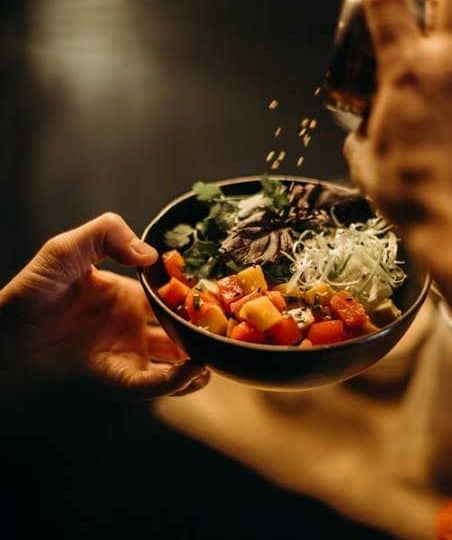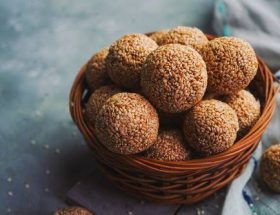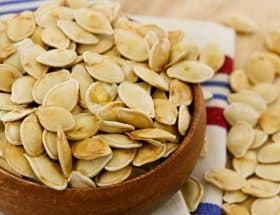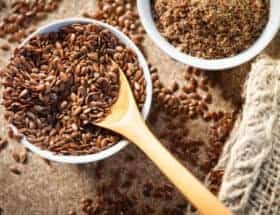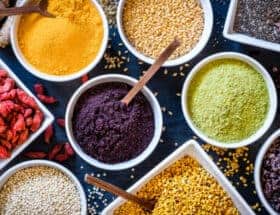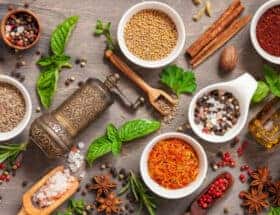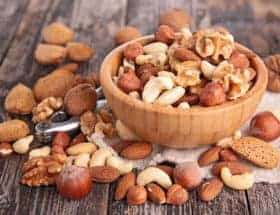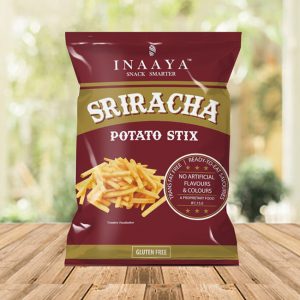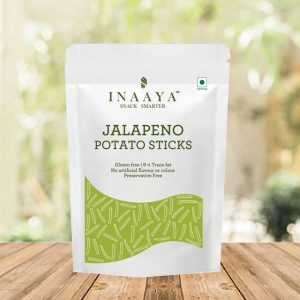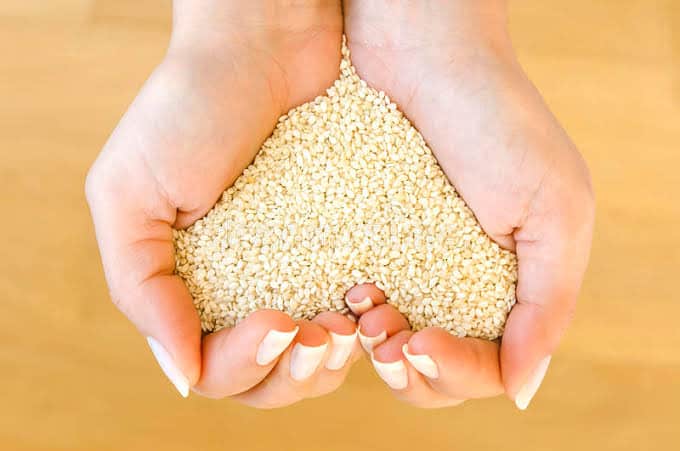 Sesame seeds are one of the most nutritious food items. These seeds are a storehouse of essential vitamins and trace minerals, which is a must for your body. Hence, this article presents all the vital information related to sesame seeds, its benefits, do’s and don’ts and so much more. Below are some brief points summed up together to improve your learning about sesame seeds and health.
Sesame seeds are one of the most nutritious food items. These seeds are a storehouse of essential vitamins and trace minerals, which is a must for your body. Hence, this article presents all the vital information related to sesame seeds, its benefits, do’s and don’ts and so much more. Below are some brief points summed up together to improve your learning about sesame seeds and health.
1. Sesame seeds – Introduction:
- Sesame seeds are edible oil seeds cultivated from the pods of the flowers grow on annual herb plants, which are mainly found in tropical and sub-tropical regions.
- Sesame seeds were firstly originated in India around 5500 years ago. After this various other countries such as China, Europe, Turkey, etc., gradually started sesame cultivation and trade. Today, sesame seeds are produced, exported and imported across the globe.
- There are 3 major categories of sesame seeds grown in India, namely black, white and brown sesame seeds. Black sesame seeds are unhulled, white ones are hulled and brown sesame seeds are unhulled and are best used for oil extraction.
- The popularity of sesame seeds has spread globally. Sudan, India, Nigeria, Myanmar and Tanzania are major producers and exporters in the world. On the other hand, China, Japan, South Korea, Turkey and Vietnam are leading importers.
- In India Gujarat, Rajasthan, Madhya Pradesh, Andhra Pradesh, Telangana, Tamil Nadu, Uttar Pradesh and West Bengal are major sesame producing states.
2. Benefits of Eating Sesame Seeds:
- Healthy Digestion: The presence of dietary fibre keeps the gut bacteria healthy and smoothen digestion.
- Gives Vibrant Skin: Sesame seeds uses are enormous and so is the seed oil which makes the skin soft and supple and keeps various skin related issues at bay.
- Triggers Hair Growth: Sesame seeds balances the pH level of hair and enhances hair growth by reducing chemical damage.
- Strong Bones and Teeth: The rich amount of calcium and mineral contents develop strong bones and teeth.
- Source of Plant Protein: The presence of plant protein is vital among sesame seeds benefits, as, it reduces oxalates and phylates – compounds that hamper protein absorption.
- Gives Healthy Heart: Health benefits of sesame seeds include building a healthy heart as these seeds reduce bad cholesterol and increases the count of good ones.
- Lowers Blood Pressure: High amount of magnesium, vitamin E, lignans avoid plaque build-up in arteries. Does lowering blood pressure.
- Good source of B vitamins: Sesame seeds benefits the body by providing essential B vitamins including, Thiamine, Niacin, and vitamin B6.
- Strong Immune System: Essential nutrients in sesame seeds refuels the immune system, which fastens the production of antibodies.
- Heals Arthritis: Sesamin in these seeds protect the cartilage and provides relief from arthritis and joint pains.
- Promotes Thyroid Health: Abundance of selenium in sesame seeds enhances the production of thyroid hormones, which aids thyroid health.
3. Sesame Seeds Nutrition Profile:
• Black sesame seeds nutrition:
(1 tbsp. or 9 gram contains)
Carbs &nsbsp;2g
Fibre &nsbsp;1.5g
Protein &nsbsp;1.9g
Healthy fat &nsbsp; 4g
Potassium &nsbsp; 42mg
Magnesium &nsbsp; 32mg
Calcium &nsbsp; 88mg
Zinc &nsbsp; 0.9mg
Iron &nsbsp; 1.3mg
Phosphorus &nsbsp; 66mg
• White sesame seeds nutrition:
(1 tbsp. or 9 gram contains)
Carbs &nsbsp; 2g
Fibre &nsbsp; 1.5g
Protein &nsbsp; 1.5g
Healthy fat &nsbsp; 4g
Potassium &nsbsp; 35mg
Magnesium &nsbsp; 29mg
Calcium &nsbsp; 11mg
Zinc &nsbsp; 0.9mg
Iron &nsbsp; 0.7mg
Phosphorus &nsbsp; 66mg
• Brown sesame seeds nutrition:
(1 tbsp. or 9 gram contains)
Carbs &nsbsp; 2g
Fibre &nsbsp; 1g
Protein &nsbsp; 1.5g
Calcium &nsbsp; 87.5mg
Iron &nsbsp; 1.35mg
Potassium &nsbsp; 50mg
Healthy fat &nsbsp; 4.5g
• Comparison between Hulled and Unhulled sesame seeds nutrition:
HULLED&nsbsp;UNHULLED
Calcium 1% &nsbsp; 22%
Magnesium 25% &nsbsp; 25%
Zinc 18% &nsbsp; 21%
Manganese 19% &nsbsp; 32%
*the percentages are based on a general dosage of 2000 calories a day.
4. Side Effects of Eating Sesame Seeds:
- Allergic Reactions: Sesame seeds or oil can cause little to extreme allergic reactions such as skin related problems, lining in the stomach, etc., in some people.
- Nasal blockage: Sesame oil, when used as a nasal spray, causes nasal dripping and blockage in some people.
- Anaphylaxis: Sesame seeds consumption releases powerful chemicals which drastically lowers blood pressure and causes breathing issues in some.
- Impact on Surgery: Sesame seeds alter blood sugar level, therefore should be avoided pre and post-surgery.
- Appendix Infection: Eating sesame seeds sometimes causes inflation in the intestine leading to appendix infection.
- Colon Cancer: Sesame seeds uses are amazing, but sometimes too much of its consumption leads to inflammation in the intestines resulting in colon cancer.
- Weight Gain: Sesame seeds are fatty, oil-rich seeds, hence must be eaten in moderation to prevent weight gain.
- Gastric Obstruction: Fibre in sesame seeds slows down the movement of food in the stomach leading to bowel obstruction and constipation.
- Diverticulitis: Eating sesame seeds in large quantities builds a painful layer on the inner walls of the intestine, which causes cramps and abdominal pain.
- Hair Loss: Preventing hair loss has always been among the benefits of eating sesame seeds, but too much of it causes hormonal imbalance, which can even cause complete baldness.
5. Sesame Seeds Recipes – Ideas:
1. Til ke ladoo:
- Dry roast white sesame seeds.
- In a pan, add ghee and jaggery to form a syrup.
- Add dry fruits and peanuts when bubbles are seen.
- Add roasted seeds and combine everything well.
- Make small ladoos when the mixture is lukewarm.
2. Sesame Smoothie:
- In a blending jar add water, ripe bananas, white sesame seeds, vanilla extract and a pinch of sea salt.
- Blend all these to form a smoothie and it’s done.
3. Crunchy Salad:
- Cut vegetables in small shapes and place them on a baking tray.
- Add olive oil, salt, lime juice, chilli flakes and white sesame seeds on the vegetables.
- Bake for 15 minutes and crunchy salad is ready.
4. Til Ki Chutney:
- Dry roast white sesame seeds.
- In a blending jar add roasted seeds, coriander leaves, lemon juice, salt, a pinch of hing and green chillies.
- Blend all these to get a fine chutney paste.
5. Sweet Sesame Cookies:
- In a bowl, add ghee and powdered sugar. Mix both these ingredients until it turns light and fluffy.
- Add wheat flour, a pinch of baking powder, and cardamom powder. Combine everything well.
- Add milk to make a tight dough. Let the dough set in the fridge for 15 minutes.
- On a plate, put some roasted sesame seeds and add honey to it.
- Form small cookies out of the door and coat them in sesame-honey mixture.
- Bake the cookies for 15 minutes.
6.Sesame Tea Latte:
- In a blending jar add soaked black sesame seeds, vanilla extract, a pinch of cardamom powder and cinnamon powder, unsweetened cocoa powder, coconut oil and ghee.
- Blend all these and pour the mixture in a cup.
• Anarsa:
- Take some rice, soak it overnight and blend it the next morning after drying it to get a fine powder.
- In a bowl, add rice powder, powdered sugar, ghee and water to form a dough.
- Add some more ghee and knead the dough to make it soft.
- Take small portions, fill in some mava (solidified milk) and give a flat round shape.
- Coat the anarsa in white sesame seeds and deep fry them until golden brown.
You have now reached the end of everything about sesame seeds. So, get started and infuse these learnings in your daily routine, as the health benefits of sesame seeds not only gives good health and body but also builds a positive aroma around you.

